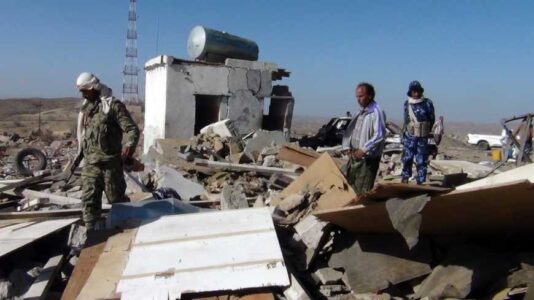
Al-Qaeda terrorists executed dentist in Yemen
A dentist anywhere in the world specializes in treating mouth-related health issues. He or she can remove a molar, fix a tooth or make a filling. But in Yemen, a dentist can be detained and be accused of espionage. Then his execution and a public display of his body can happen in broad daylight.
On Aug. 15, al-Qaeda operatives in Yemen’s Bayda province killed Madhar al-Yousifi, a 40-year dentist, and tied his body to a makeshift cross. The militants alleged that Yousifi was spying on them so that they could be targeted by American drones.
Yousifi, originally from Yemen’s Taiz province, spent over 10 years in the al-Sawma district of Bayda in his dental clinic.
Two months ago, he quarreled with his wife, leading to a divorce. This dispute reached al-Qaeda operatives at the request of the divorced wife’s family, the victim’s brother said.
The group incarcerated the dentist for two months and trumped up charges to justify his killing and the takeover of his properties. Though the dentist’s brother managed to get a written document from Yousifi’s ex-wife saying she was withdrawing her case, al-Qaeda declined to set him free.
Before his execution, al-Qaeda recorded a video of the victim saying he conspired against al-Qaeda operatives and planted microchips in some locations. However, rights activists said al-Qaeda members coerced Yousifi to confess to crimes he never committed or even thought of.
In a country such as Yemen where the state is absent, a civilian such as this dentist can do nothing to confront a militia group like al-Qaeda. When militants dominate, lawlessness prevails and these militias take it upon themselves to decide who is the good citizen and who is not.
Ghamadan al-Yousifi, a Yemeni writer and an old school friend of the dentist, said what happened is mind-boggling. He wrote, “At first glance, I could not believe that this took place in Yemen, and it turned out that this young man was the son of my village, the dentist Madhar Mohammad [Yousifi].”
Ghamadan al-Yousifi had known the dentist since childhood. He said Madhar al-Yousifi “was a brilliant student in our school. He studied medicine, then worked in Bayda province and everyone who knew him recognized his work.”
Governments, organizations and individuals have deplored the summary execution. Yemen’s government said the killing is “a despicable crime.” Information Minister Muammar al-Eryani said the government is committed to confronting terror groups whatever their names and wherever they are.
Over the last six years, the Yemeni government has been fighting Iran-allied Houthis in several provinces, and this has created room for the growth of al-Qaeda and Islamic State militants.
Michael Aron, the British ambassador to Yemen, described what al-Qaeda did as appalling. “The brutal killing of Dr. Madhar al-Yousifi is at the hand of al-Qaeda in Bayda … [and] is a disgusting act. Yemen needs peace and security to completely get rid of terrorism,” Aron tweeted.
The Geneva-based SAM for Rights and Liberties organization said, “The perpetrators forced him to make confessions under duress and they granted themselves the authority to detain, investigate, prosecute and execute him though they have no legal authority.”
Bayda is one of the hotbeds of al-Qaeda militants in Yemen. In January 2017, on orders of President Donald Trump, the United States launched a ground operation in the Yakala district of the province. The raid left at least 16 civilians (including an American girl), a US Navy Seal and 14 suspected al-Qaeda militants dead. Today, al-Qaeda still has a considerable presence in some areas of Bayda and drone strikes have not been an effective approach to thwart the growth of extremist groups in Yemen.
Mohammed Samei, a Taiz-based journalist, told Al-Monitor that the Taizi dentist was the victim of the absence of the rule of law in an al-Qaeda-controlled area in Bayda province. He said, “Taizi people like Yousifi can be found in all Yemeni provinces working or running their own business or service centers. Instead of rewarding him for a decadelong health service in Bayda, al-Qaeda rewarded him with death. It is really worrying to see this mayhem and lawlessness.”
Samei said, “The ideological groups are hard to negotiate with. They think they are following God’s instructions and feel no guilt when they harm people. The ideal way to deal with them is confronting them and stopping their extremism. To do this, we need a powerful government.”
Source: Al Monitor





